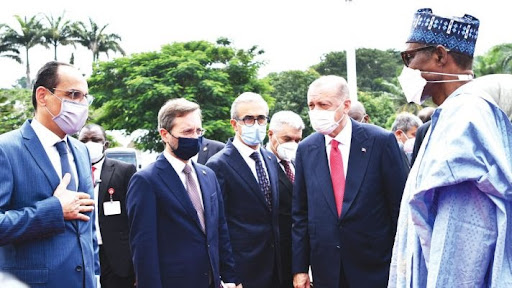
Turkish President Recep Erdoğan has called on his Nigerian counterpart, Muhammadu Buhari to close down multi-billion naira businesses of exiled Muslim cleric Fethullah Gulen, whom he blames for the July 2016 failed coup in Turkey.
Gulen leads an international faith-based civil society organisation, known as The Gulen Movement, that owns several inexpensive educational establishments in Nigeria, including Surat Educational Ltd., Abuja; Nile University in Abuja; and the Nigerian Tulip International Colleges (NTIC), which was formerly known as Nigerian Turkish International. The group also owns the Nizamiye Hospital in Abuja.
Speaking at a joint press conference on Wednesday, Oct. 20 in Abuja, Nigeria’s capital, Erdoğan, who is in Nigeria on an official visit, sought President Buhari’s support for his anti-Gulen campaign, warning that he has evidence that those who tried to topple his government “are active in Nigeria as well.”
The Turkish President said he “hopes and pray” that the relations between the two countries would be further developed based on a win-win situation and based on mutual respect.
Erdoğan’s two-day visit to Nigeria was part of his tour of four countries, signing bilateral agreements on security and economic trades.
“We are ready to share our capabilities, every extending capacity as Turkey with Nigeria, especially in the field of defence, industry and security, which are being praised by the globe,” he said.
He said he expected Nigeria to reciprocate the Turkish government’s efforts in the fight against terrorism.
Following the coup that killed over 250 people in Turkey, Erdoğan declared the Gulen Movement a ‘terrorist group.’ As part of his government crackdown on the Gulen Movement, he called on African leaders to turn down Gulen’s investments in their countries.
The Turkish president had also asked the United States of America, where Gulen resides, to extradite him to Turkey. While the US said there was no clear evidence of Gulen’s alleged involvement in the coup, Gulen himself has maintained that he is innocent.
“Erdogan will have to supply convincing evidence to back up the allegations he levels against Gulen and offer alternatives if he is to win over his African partners,” Ufuk Tepebas from the Center for African Studies at the University of Basel in Switzerland once said in an interview with German Newspaper, DW.
“Otherwise, some African countries may perceive this as an imposition, and this constitutes a risk to bilateral relations.”
Support Our Journalism
There are millions of ordinary people affected by conflict in Africa whose stories are missing in the mainstream media. HumAngle is determined to tell those challenging and under-reported stories, hoping that the people impacted by these conflicts will find the safety and security they deserve.
To ensure that we continue to provide public service coverage, we have a small favour to ask you. We want you to be part of our journalistic endeavour by contributing a token to us.
Your donation will further promote a robust, free, and independent media.
Donate HereStay Closer To The Stories That Matter




